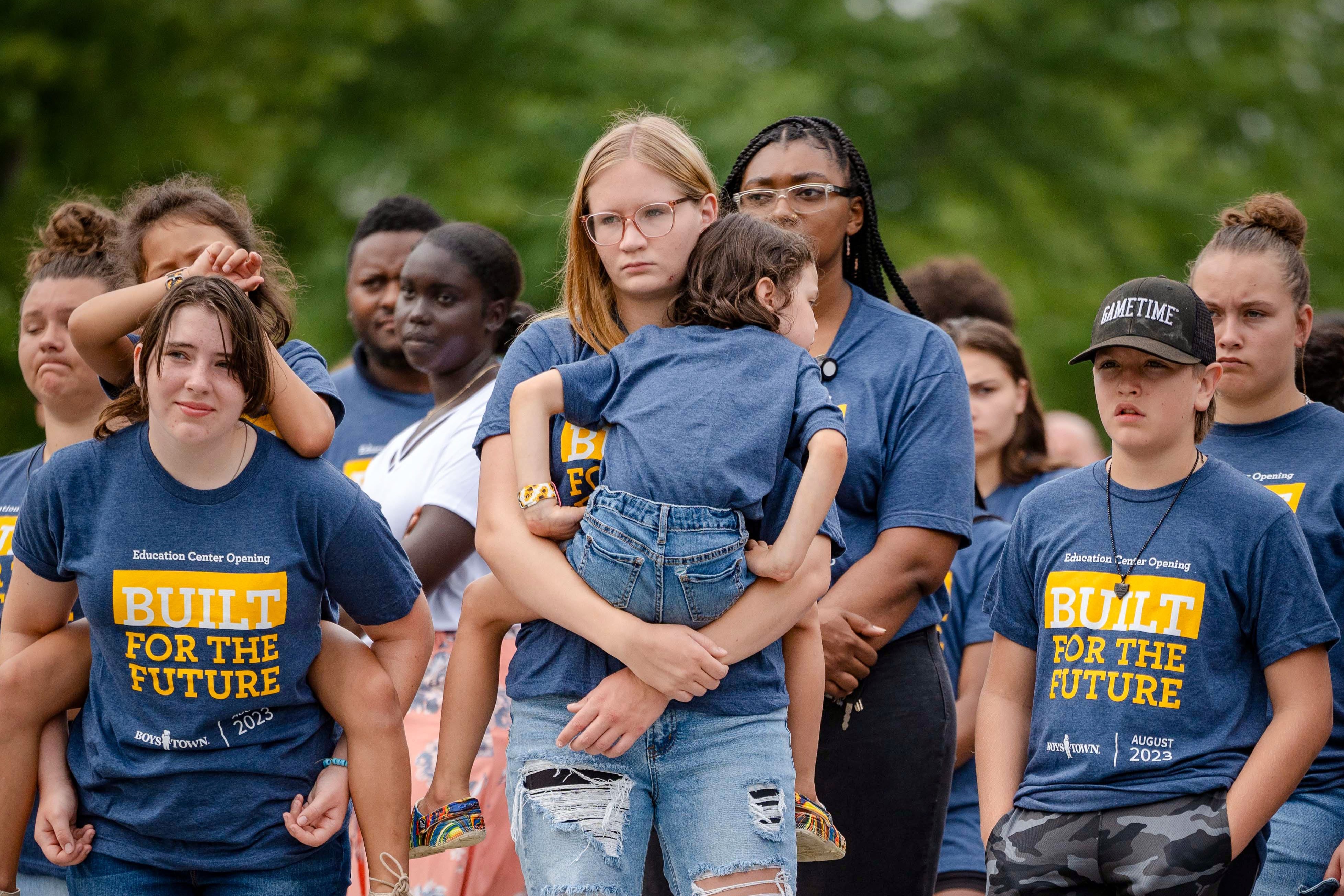
Content warning: Sexual assault.
'I know that I'm not the only one,' says woman who has sued Boys Town, alleging sex assault.
OMAHA, Neb.—Shaelyn Nielsen remembers the door of the large upstairs bedroom opening early that morning and the sound of breathing growing nearer.
The 18-year-old tried feigning sleep as, she said, the man who’d been a father figure to her for more than a year slid into her bed and groped her under her oversized T-shirt and moon-and-star pajama bottoms. As he rubbed himself against her from behind, she said, she resisted and cried muffled tears.
Chiding her, she alleges, Sherdale Green, a father of two, told her the boys living at Boys Town were not what she wanted, saying: “You know only I can give you what you want.”
Nielsen said she now recognizes, at age 25, the inappropriate touching, hugs and grooming leading up to that moment in 2016 with a house parent at Boys Town, the storied 106-year-old Omaha youth home, co-ed since 1979, that markets itself as a haven for healing and hope.

As a nonprofit journalism organization, we depend on your support to fund more than 170 reporting projects every year on critical global and local issues. Donate any amount today to become a Pulitzer Center Champion and receive exclusive benefits!

She said she didn't realize until that morning, just weeks before she was headed to college, that she was living with a predator.
Neither Green nor his lawyer responded to requests for interviews about the sexual abuse allegations laid out in a civil lawsuit brought against him and Boys Town by Nielsen and a former housemate, Tayler Weatherall. In a court document responding to the lawsuit, Green and Boys Town denied the allegations.
In September, Weatherall, 24, reached a private, out-of-court settlement with the charity. Nielsen's case is scheduled to go to trial next year.
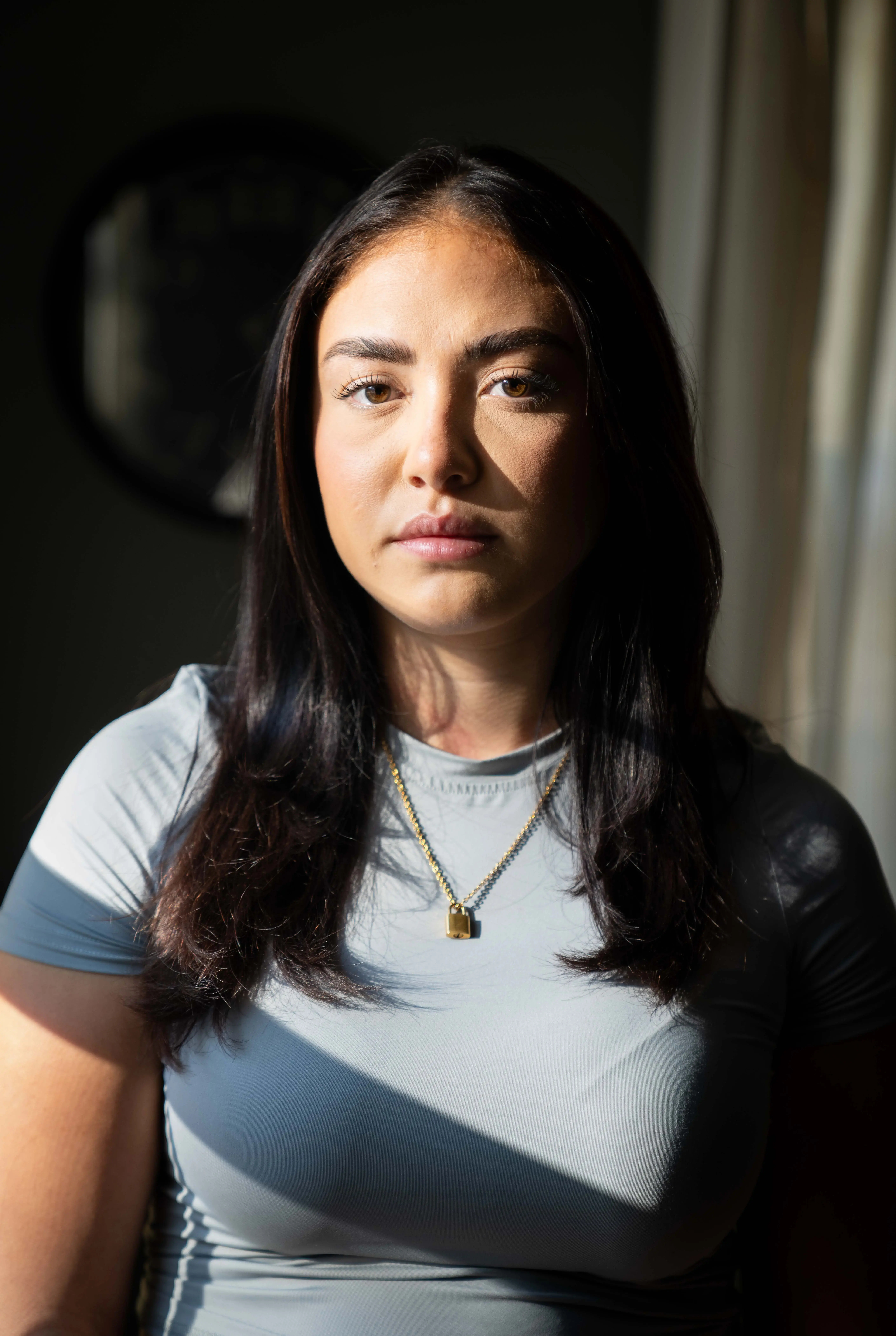
The allegations against the iconic Nebraska home come amid a national reckoning over abuse suffered by youth placed by courts or parents inside residential facilities ― a well-documented problem that has gained bipartisan attention from a coalition of lawmakers in Congress. Whether tough-love boarding schools, wilderness camps or bare-bones, for-profit operations, facilities across the country have closed in droves over the last decade following media exposés, criminal probes and state investigations.
Boys Town ― one of the oldest, largest, wealthiest and most-renowned youth-focused charities in the country ― has largely skirted the kind of scrutiny and scandals that have dogged other facilities. Donors across the country, moved by the mission and legend of Boys Town founder Msgr. Edward J. Flanagan, continue to shower the nonprofit with contributions and bequests ― almost $817 million from 2017 to 2021, its tax filings show.
But crime data obtained by the Des Moines Register shows 12 rapes were reported at Boys Town in Omaha over the past five years. The reports include a case reported in 2018 where a different Boys Town house parent had sex with a 15-year-old ward in Boys Town's care. Secrecy cloaks the remainder of the reports; Boys Town police refused to release even basic details, an investigation by the Register found.
The 12 rape reports were made at Boys Town during a time when it has operated at less than half its licensed capacity. Fewer than 300 children have been housed in its family-style foster homes in recent years — fewer than those enrolled in many U.S. elementary schools.
Neither Nebraska's inspector general for child welfare nor Disability Rights Nebraska, which are charged under state and federal law with providing added oversight, investigated the alleged rapes, according to the directors of both agencies.
Boys Town uses its own hired security and has its own village police department, which officials representing the charity said operates independently from the organization. Violent crime statistics compiled by the police department over the past five years also included reports of six aggravated assaults and at least 111 other assaults.
And those numbers, obtained from the FBI’s Uniform Crime Reporting Program and the Nebraska Crime Commission, by definition are incomplete. The FBI reports from 2018 and 2019 exclude nonaggravated assaults, which are not required to be reported to the FBI.
Boys Town Police Chief William Clark, who declined to be interviewed for this article, refused to provide police incident reports detailing the 12 reports of rape on campus, even with the names of minors redacted. Contacted by certified mail after he failed to respond to messages, Clark cited a section of Nebraska law that gives law enforcement discretion to withhold investigatory reports.
In contrast, other law enforcement agencies in Nebraska, including authorities in Omaha and Platte County, where Boys Town has an alternative school, have released the same kinds of police incident reports.
For data collection purposes, the federal Justice Department defines rape this way: "Penetration, no matter how slight, of the vagina or anus with any body part or object, or oral penetration by a sex organ of another person, without the consent of the victim. Attempts or assaults to commit rape are also included; however, statutory rape and incest are excluded."
John Collins, a Brooklyn, New York, media consultant hired by Boys Town, said he had not seen the incident reports written by Boys Town police in connection with the dozen reports of rape. Nonetheless, he suggested repeatedly in discussions with the Register that the offenses were not rapes but instead mere touching among high schoolers.
Congress is trying, again, to pass protections for youth in residential care
Fifteen years ago, Congress’ watchdog, the Government Accountability Office, warned federal lawmakers of the need to better protect already traumatized children from physical, emotional and sexual abuse at public and private residential facilities.
The agency studied over 1,500 cases of child maltreatment ― one year's worth ― in 34 states and numerous examples of deaths in the multibillion-dollar industry. Armed with that evidence, members of Congress tried for years to pass federal legislation that would establish minimum standards to protect youth and provide a way for the public to check for substantiated cases of abuse at the facilities.
Last year, the GAO released a new report, and renewed a call to action, saying the U.S. Department of Health and Human Services should facilitate information-sharing among states to better prevent and address abuse. Stakeholders in that research said states also needed to take action to hold facilities more accountable and improve oversight and training for facility staff and state investigators.
This year, 46 members of the U.S. House, both Republicans and Democrats, and 15 members of the Senate, including former Nebraska Gov. Pete Ricketts, a Republican, have co-sponsored legislation aimed at increased transparency in child residential care, signaling anew they want more oversight and accountability.
As with many children who have been placed in long-term congregate care, Nielsen said she felt very much alone after she arrived at Boys Town at age 15 from Port Huron, Michigan.

Her mother died when she was 12. Her widowed grandmother, who was slowly fading from breast cancer, had frequently kept her home from school.
In 2015, a juvenile judge and her probation officer, sensing the teen needed a stable environment, agreed Nielsen should be flown 800 miles from home to Omaha. Nielsen settled into a foster home on the Boys Town campus with "parent-teachers" who looked after her, tracked her medication, guided her and prayed together with her and other wards.
Like other homes for troubled kids, Boys Town had rules and lots of them, she said. No cell phones, no social media, no calls home for longer than a half hour, no holding hands or kissing boys, and no talking back. Her every behavior, at home and at school on the same campus, was tracked and logged daily on a point system that could result in privileges lost or gained.
Still, she said, she got what she craved most: a readymade family. “At first, I loved it,” Nielsen said. “I was head over heels for Boys Town.”
But all that faded, she said, after she was moved at 17 to another home on the Boys Town campus where, she said, she was sexually assaulted.
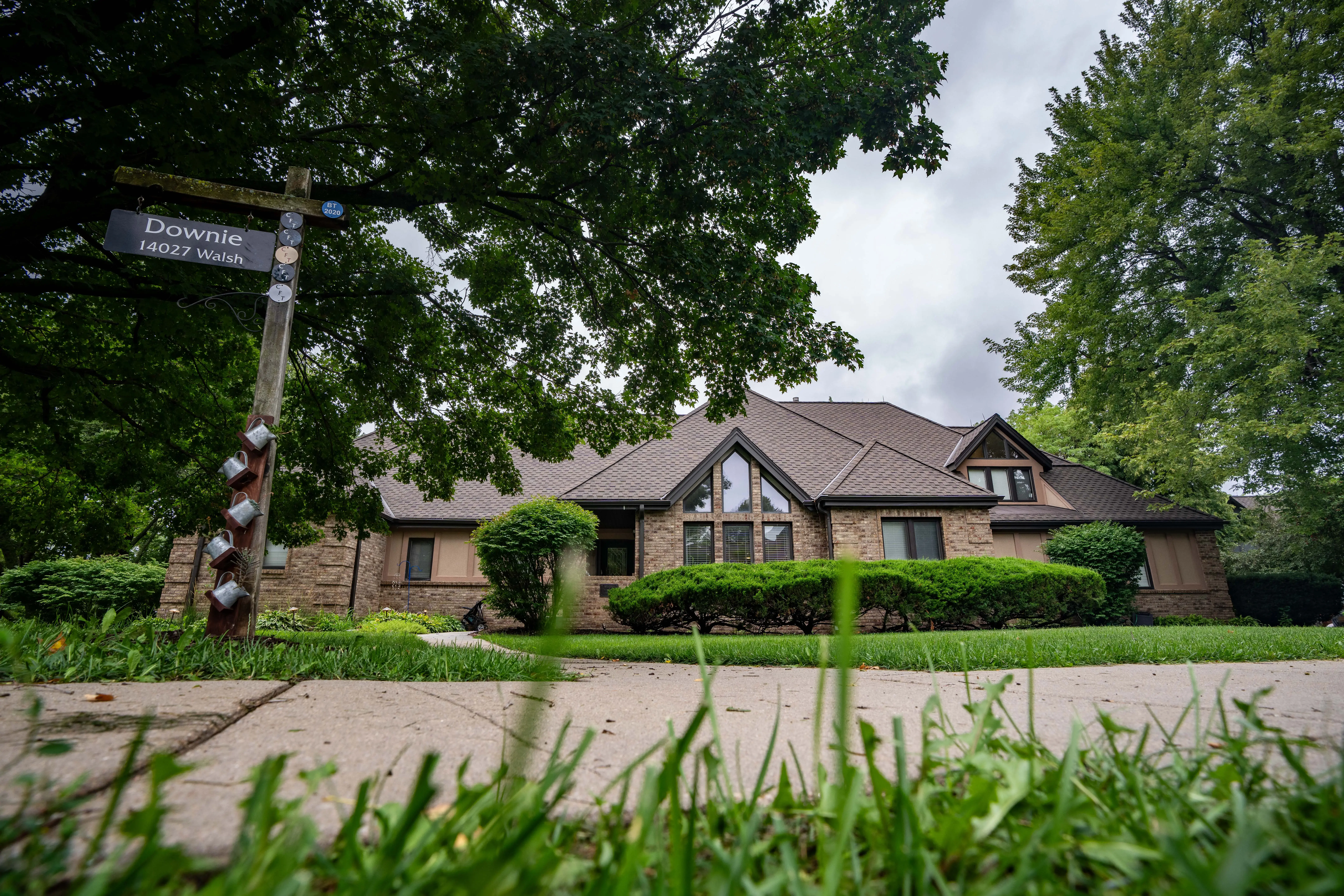
Boys Town says it offers children the 'highest level of care and safety'
Headquartered in an idyllic, 640-acre village on the west side of Omaha, Boys Town advertises that it provides the “highest level of care and safety for children.”
The nonprofit pairs children in each of 50 family-style foster homes with a married couple who are supposed to help monitor their behavior. The nonprofit also has satellite residential programs in New Orleans; Portsmouth, Rhode Island; and Orlando and Tallahassee, Florida.
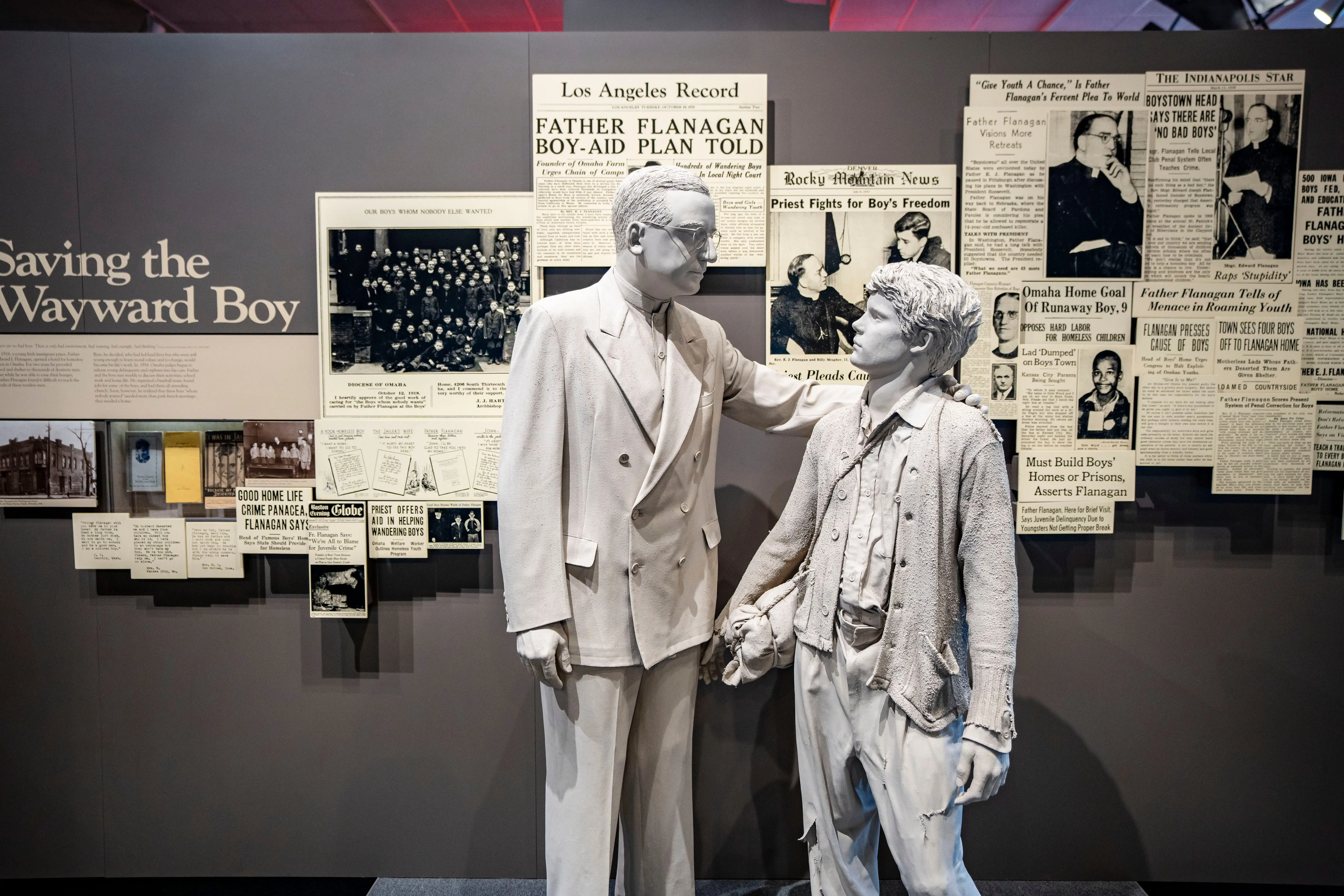
Barb Vollmer, the nonprofit's vice president of youth care, said every employee at Boys Town understands that children's safety is the organization's first priority. She said any concerns parents might have are addressed immediately when they bring their children to the campus.
"We know there are going to be challenges for residential care, but we're up for it," Vollmer said. "It's a tremendously rewarding place to be because there are so many rewarding things that happen on this campus with these kids."
Boys Town says all those hired to care for nearly 700 youth annually in its residential programs are trained about appropriate boundaries and observed by supervisors. Youth are trained, too, in how to protect themselves. Abuse or unwelcome behavior can be reported any number of ways ― online, by phone or in person, policies show. A compendium of policies and procedures aims to ensure youth are protected and complaints are investigated.
"Bad things can and do happen in child care settings, even when staff members and leadership are diligent and watchful. And while some of these situations often are unavoidable, they are still unacceptable. Even one incident in which a child is harmed is one too many."
Statement from Boys Town
The collection of policies shows Boys Town has an independent youth safety audit department ― which reports to its CEO, national board and legal department ― that conducts investigations of any report, suspicion or observation of improper staff conduct. "When necessary, findings of such investigations must be reported to external agencies like Child Protective Services and law enforcement," it said.
Though Boys Town says it does "everything possible" to protect the boys and girls in its care, it has wrestled with abuse of children over its long history. That includes acts of sexual abuse by staff, youth living there or priests assigned to live on its home campus by the Roman Catholic Archdiocese of Omaha, according to media reports, crime statistics and a report on clergy abuse by Nebraska's former attorney general.
"Unfortunately, no safety system is perfect. Bad things can and do happen in child care settings, even when staff members and leadership are diligent and watchful," the charity said in a statement. "And while some of these situations often are unavoidable, they are still unacceptable. Even one incident in which a child is harmed is one too many."
Attorney: 'I've never seen a worse case of the fox guarding the henhouse'
In Nebraska, few institutions are as beloved as Boys Town, whose history has been entwined with that of the local Roman Catholic archdiocese since Flanagan started the home in 1917. But former residents and advocates for youth say it also is a cloistered community that largely polices itself.
Tommy James, a Birmingham, Alabama, attorney who has filed numerous lawsuits stemming from allegations of abuse in youth residential homes, said he finds it incredibly problematic that the village, made up of Boys Town employees, uses its own police to investigate allegations made by children living there.
That leaves little recourse if a young person or staff member reports an alleged crime to Boys Town police and doesn't believe it was investigated properly. Omaha police do not investigate reports of crime at Boys Town.
“It’s amazing. I’ve never seen a worse case of the fox guarding the henhouse,” said James, who has never sued Boys Town.
“The word is getting out in the survivor community about what’s happening in these facilities,” he said. “Perpetrators know these are target-rich environments. And these children don’t have a way out.”
Tommy James, an Alabama, attorney who has filed numerous cases alleging abuse at youth residential homes
James said the vast majority of facilities for youth across the country already receive scant monitoring by state officials and have little transparency to the public while housing some of America's most vulnerable youth. Widespread abuse continues, he said, in spite of more stringent regulations and laws passed in several states, including in his home state of Alabama as well as California, Michigan and Oregon.
“The word is getting out in the survivor community about what’s happening in these facilities,” he said. “Perpetrators know these are target-rich environments. And these children don’t have a way out.”
Like most residential facilities for youth, Boys Town doesn't provide any public access to substantiated abuse data collected for state and federal authorities.
Nebraska’s Department of Health and Human Services declined to release to the Des Moines Register even annual statistics showing the number of abuse reports at Boys Town, saying it believes releasing them would violate state and federal confidentiality laws.
The children placed at Boys Town and other youth residential facilities, who often have been removed from their homes and placed in foster care because of abuse or neglect, have histories that put them at higher risk of experiencing sexual abuse and exploitation than their peers in the general population, national research shows.
Exact numbers are difficult to calculate because many victims don't report sexual abuse, or wait for long periods before doing so, according to a 2017 report by Nebraska’s child welfare inspector general.
Collins told the Register that any claim Boys Town does not protect children or that it does not report incidents to law enforcement for investigation is "absolutely false."
He said Boys Town reports all accusations to law enforcement and Child Protective Services and fully cooperates with the agency's independent investigations.
He said the Boys Town police department declined to refer six of the 12 rape allegations to Douglas County, Nebraska, prosecutors due "either to insufficient evidence or unsubstantiated claims." Six others were referred to prosecutors for review for possible prosecution. Only one person, a house parent named Jaime Rivera Jr., was tried and convicted.
Rivera's case was reported in 2018, the same year Nielsen said she first reported her accusation of abuse to Boys Town police. Both cases were handled by Sgt. Adam Gill, emails and court records show.
Rivera admitted during the investigation that he had sex repeatedly with a 15-year-old ward from Texas, court records show. When the girl threatened to expose Rivera before his arrest, he paid her $2,000 in hush money, the records show. He was convicted of first-degree attempted sex abuse on a child, a felony.
In 2020, a Nebraska judge sentenced Rivera, then 36, to 20 to 30 years in prison. In 2022, he died in prison of COVID-19, according to the Nebraska Department of Corrections.
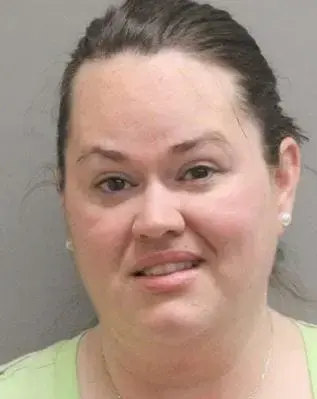
The Register contacted the Douglas County Attorney's Office to inquire about how Nielsen's accusations against Green ― and other cases ― were handled. But after the initial inquiry, the office did not respond to further messages seeking comment. A woman in that office also said it couldn't track cases without names or other details, which Boys Town police would not provide.
At least one other Boys Town employee was convicted of sexual abuse of a youth at the facility in the past decade. In 2014, Nebraska’s Department of Health and Human Services was notified of a sexual relationship between Robyn Wood, a shift manager supervising other employees, and a 17-year-old under the guardianship of the state of Nebraska.
That report led to a criminal investigation, and Wood’s conviction in 2015 for having sex with what was deemed a “protected person.” She was sentenced to five years of probation.
Under Nebraska law, it is illegal for any employee or contractor of the Nebraska Department of Health and Human Services to have sex with a state ward, even if the sex is consensual.
All Boys Town abuse claims reported? Not so, former residents say.
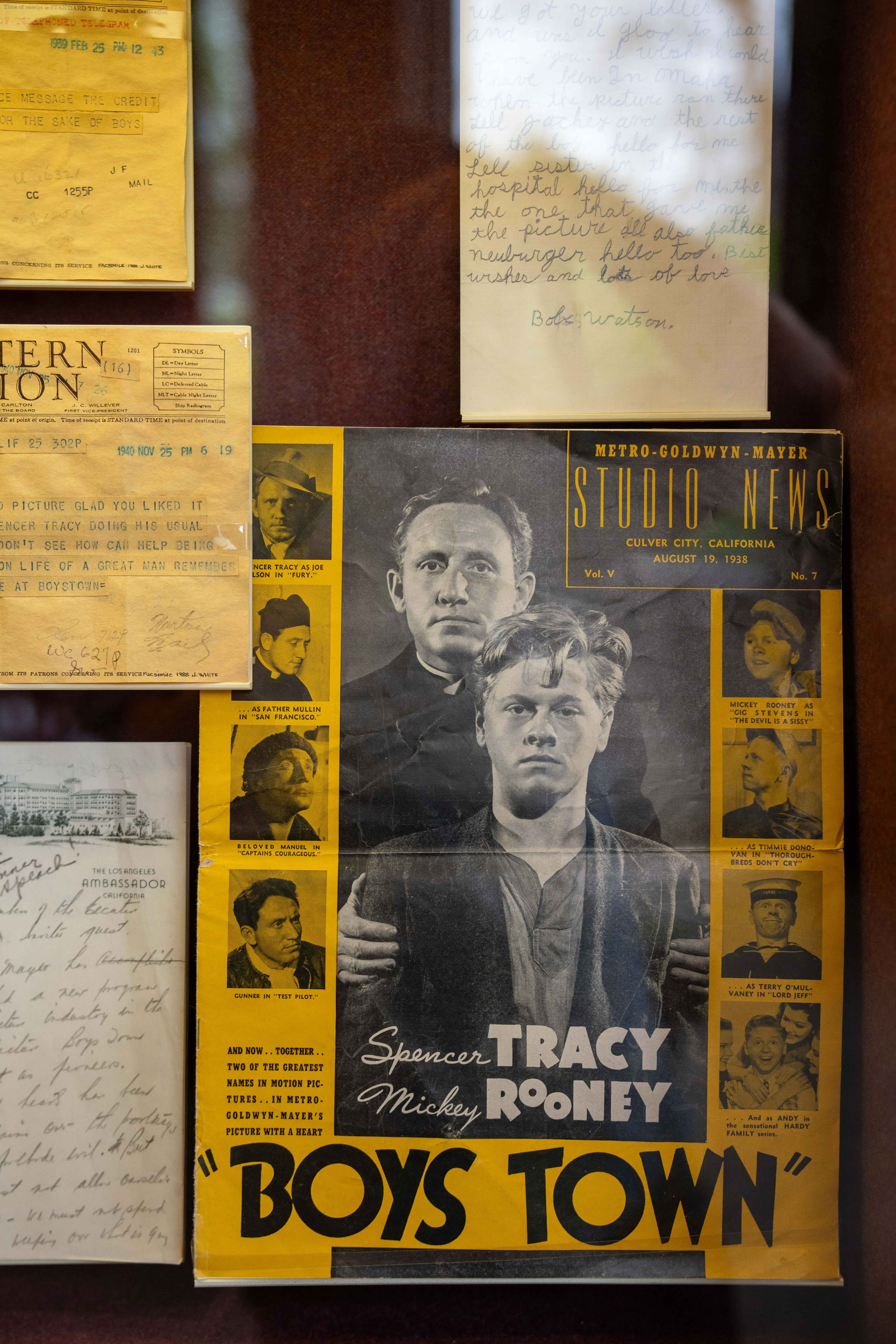
While hundreds of former Boys Town youth have given testimonials to its benefits, Patrick Faris says it's also true that youth have been traumatized there.
Faris, 39, said he lived in Harlan, Iowa, when he was sent to live at Boys Town in 1997 at age 13.
He said he was severely bullied when his house parents and other residents learned he was gay. His house mother, he alleges, blamed him for abuse perpetrated by another student at the home who sexually exploited and assaulted him after offering him protection.
No one reported the exploitation and abuse he suffered, he said, though his house parents were well aware of it at the time.
He said he was too young to understand all that was happening and he felt helpless, eventually attempting suicide. He showed records to the Des Moines Register from the state of Iowa substantiating both his placement at the home and his hospitalization after the attempt. Later, he was placed in a foster home.
Boys Town did not respond after the Register notified officials about Faris' concerns.
“The question is: Who’s policing them? They’ve held onto this sort of ABC-after-school-special, ‘Leave It To Beaver’ image and projected that there are no failures. There are failures," he said. "For me, foster care was 1,000 times better than Boys Town. I think it’s dangerous for the people for whom it doesn’t do good."
In their lawsuit, filed in 2021, Nielsen and Weatherall echoed Faris' concerns, saying sexual abuse at the home was not investigated as it should have been under state law.

The lawsuit alleges that the nonprofit was negligent by hiring a sexual predator to supervise teenage girls. It accuses Boys Town of failing to restrict male "family teachers" from being alone with teenage girls, to properly investigate and report complaints of sexual misconduct against Green, to terminate Green in a timely manner, or to comply with the mandatory reporting requirements of Nebraska law.
In court filings, Green and Boys Town rejected those allegations: “If indeed the plaintiffs suffered damages, which Father Flanagan’s Boys Home denies, the plaintiffs failed to mitigate alleged damages.”
Before Nielsen alleged she was sexually assaulted, she said, one of her housemates tried to report Green's behavior, including “creepy hugs” from behind and inappropriate touching. Nielsen said the behavior began during the middle of her junior year in high school and became more frequent the longer she was in the Greens' home.
She said that when Michelle Tauber, Boys Town’s director of aftercare and successful living services, questioned her about the behavior, the 47-year-old house parent and his wife walked into the house. She said in her lawsuit that she downplayed the behavior and recanted because she had nowhere to go and feared retaliation.
Collins disputed Nielsen's account, saying a friend of Nielsen's said only that Green had given the girl a funny hug. He said Tauber questioned Nielsen in a private conversation with no house parents around, and Nielsen denied ― multiple times ― that Green had done anything to make her feel uncomfortable.
Nielsen said it was only after leaving Boys Town and talking to Weatherall and another housemate that she mustered the courage to report the alleged sexual assault to Boys Town. In 2018, she alleges, she returned to Boys Town to tell Tauber and Gill, the police sergeant.
Tauber, she said in her lawsuit, told her she would report the incident to Nebraska's child protective services, but never did. No one working for the state ever called her about the assault, Nielsen told the Register.
"I know it's happening (sexual abuse), and some of those kids are so young and they don't have families of their own or have a voice. You do feel very isolated there."
Tayler Weatherall, who sued Boys Town, alleging sexual abuse, and has reached a private settlement of the lawsuit
Weatherall, who was placed by a Nebraska judge for about 10 months at Boys Town from 2015 to 2016, said in the lawsuit that she too, was groomed, harassed and fondled from behind by Green. She said she came forward with her mother's support in 2019 as a freshman in college and reported the abuse to police, forwarding text messages to Gill that Green allegedly sent her while she was still a minor.
That same year, the house parent was fired.
After the civil lawsuit became public, Weatherall said, she and Nielsen received death threats from Green's supporters.
"I'm not the type of person who wants attention, and I have no reason to lie. This is not publicity I would want for myself. I'm also scared of law enforcement," Weatherall said. "But I know it's happening, and some of those kids are so young and they don't have families of their own or have a voice. You do feel very isolated there. They watch you; they listen to your conversations. If you write a letter, they have to read it before it is sent."

Weatherall and her mother, Kelli Pringle, both said Boys Town's self-policing failed them after they reported Green in 2019. By then, at least two other students had reported inappropriate behavior by Green to Boys Town, they said.
Both told the Register they tried to go to Omaha police when Boys Town police failed to act, but Omaha police told them they could not do anything because Boys Town police were handling the case.
Weatherall and Nielsen said Gill, the police sergeant, promised for months to pursue a criminal case, but later backed away, saying in an email there wasn't enough evidence.
“It took them over a year to tell us they weren’t moving forward,” Nielsen said. “That was it. That was the closure we got.”

Boys Town said the police department twice referred Green's actions to the Douglas County Attorney's Office for review, but the county attorney rejected the case for prosecution, saying there wasn't enough evidence to proceed. Green was never charged with any crime.
Boys Town said employees also referred the other two young women's cases to child protective services in 2019, when Weatherall made her complaint. But child protective investigators declined to investigate because they were no longer minors, Collins said.
Complaint in 2023 prompts visit from Nebraska inspectors; other agencies in dark
As recently as January this year, inspectors at Nebraska’s Department of Health and Human Services made an unannounced visit to Boys Town’s Residential Treatment Center, an inpatient psychiatric facility that typically houses 50 to 70 children and adolescents with the most severe behavior and mental health issues.
According to a state report, an unidentified complainant had alleged Boys Town employees failed to protect children from sexual abuse or other injury, failed to protect children with "adverse behaviors" and failed to properly supervise kids. But a state inspector found nothing wrong.
Boys Town therapists and physicians talked with patients after the abuse was reported, the report said. They found Boys Town had policies and systems in place to ensure safety and that staff ratios were met, the report noted.
Nebraska law requires any person who suspects child abuse to report the accusation to a hotline run by the state’s Department of Health and Human Services. The report did not say whether child protection workers were contacted to investigate the alleged sexual and physical abuse.
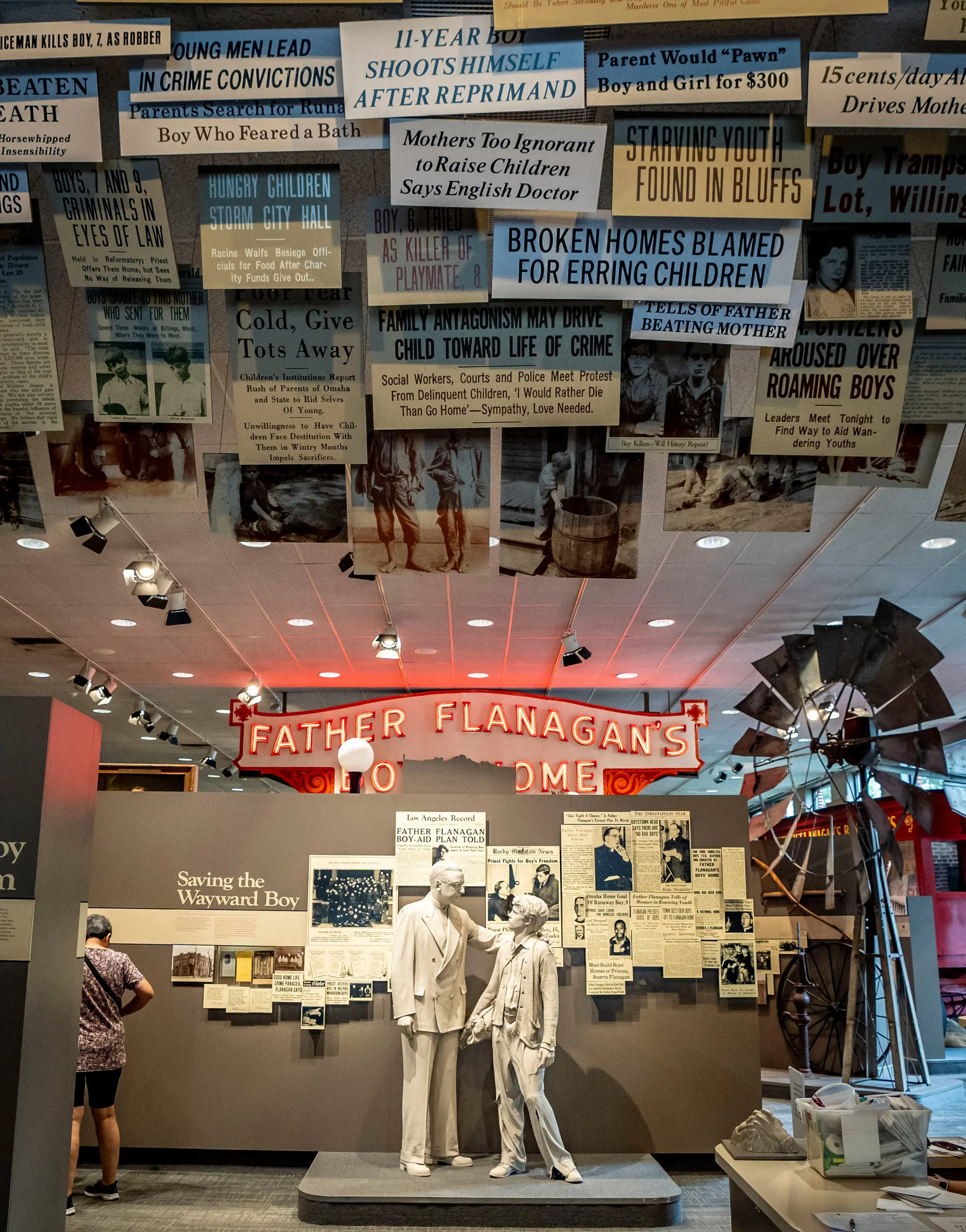
Nebraska law also requires the state’s Department of Health and Human Services to notify the state's Office of Inspector General of deaths and serious injuries of state wards, as well as all allegations of sexual abuse. Disability Rights Nebraska, a protection and advocacy organization, also is supposed to receive "serious occurrence" reports from facilities that provide inpatient psychiatric services to individuals under 19, which Boys Town provides on its campus.
But the leaders of those agencies told the Register this summer they had not received any reports of rapes or other sexual abuse from Boys Town.
Nebraska Child Welfare Inspector General Jennifer Carter said investigations are confidential, but said that her office hadn’t received any reports about sexual abuse from Boys Town in years. Carter stressed that her office receives reports only about Nebraska wards, not those from other states.
Tania Diaz, chief executive of Disability Rights Nebraska, also said this summer her agency hadn’t received any reports from Boys Town's residential psychiatric facility since June 2022.
“There was a time when we would get reports of abuse and neglect, but a lot of times they just ended up being injury reports of staff members. We haven’t gotten any reports recently,” Diaz said.
Diaz said Disability Rights Nebraska has reached out to Boys Town officials to underscore the reporting requirement to ensure that any incidents within their psychiatric facility are reported.
'No rape of children is acceptable,' says Iowa's director of human services
The Nielsen and Weatherall lawsuit, filed by the Goosmann law firm, alleges that once the courts placed the girls at Boys Town, the home and its employees violated their duty to ensure their safety.
It alleged that Boys Town was negligent by hiring a sexual predator to supervise teenage girls and that it failed to properly investigate and report the complaints of sexual misconduct, to properly train the house parent, to fire him in a timely manner or to follow child abuse mandatory reporting requirements under Nebraska law.
Weatherall and her attorney both said they could not comment on the confidential settlement, reached in September.
Boys Town officials declined to say on the record if they have reached settlements with any other former students in the past 10 years.
In the meantime, more than $14.6 million from the U.S. Department of Health and Human Services flows to the program each year, Boys Town’s tax documents show.
And states entrust Boys Town with their wards and delinquents: Iowa’s Department of Health and Human Services, which contracts with Boys Town for foster care, spent more than $1.3 million last year to accommodate 24 youths, typically for 10 to 18 months at a time.
State officials in Iowa have expressed great confidence in Boys Town's model, saying they may want to emulate its residential program in the state.
But when told of the rape claims reported in Nebraska and asked how many sexual assaults or rapes of children would be considered normal or acceptable for a residential facility for youth, Kelly Garcia, the head of the Iowa Department of Health and Human Services, responded, “No rape of children is acceptable.”
As her lawsuit proceeds, former Boys Town ward describes no healing, lost hope
If any youth home in the country had the experience, training and resources to protect her, Nielsen said, it should have been Boys Town.
But today, she said, she suffers post-traumatic stress and debilitating flashbacks that keep her from work. She’s had to check into an emergency clinic with panic attacks when she’s been unable to manage them on her own.
“I feel like I lost the ability to trust anyone,” she said. “I put my … trust in someone who I thought would never hurt me and then they did.”

Since her lawsuit was filed, she said, others who lived at Boys Town have come forward on social media with stories of abuse. Some also have blamed her for what happened.
People have said, 'Why did you wait so long? … Tell me, what would you have done differently than I did? Would you have felt comfortable to come forward in a place that was that restrictive?'
“All I wanted was a home.”
Statement from Boys Town spokesperson
Boys Town refused many requests for more detailed information about its handling of allegations of sexual abuse at its Nebraska home campus. Ultimately, it issued this statement, presented here in full:
"We are proud of our work protecting children and our track record of helping turn around the lives of tens of thousands of kids.
"The safety of our youth is the number one priority of Boys Town – and any claim that we do not protect them or report incidents to law enforcement for comprehensive investigation is absolutely false.
"Boys Town reports all accusations to law enforcement and/or Child Protective Services, two independent entities, and fully cooperates with their independent investigations. Our safety numbers reflect the fact Boys Town actively encourages student reporting on campus – no matter the circumstance or degree of offense.
"Judicial and law enforcement leaders from across the country turn to Boys Town for help when every other juvenile support structure has either failed or given up. That’s a responsibility Boys Town takes extremely seriously.
"Boys Town has a robust training program for both staff and youth about what is and is not appropriate. The organization actively encourages youth to report any and all activity that makes them feel uncomfortable. And when a report is made, Boys Town acts quickly and decisively – always putting the child’s safety first."
How the Register reported this story
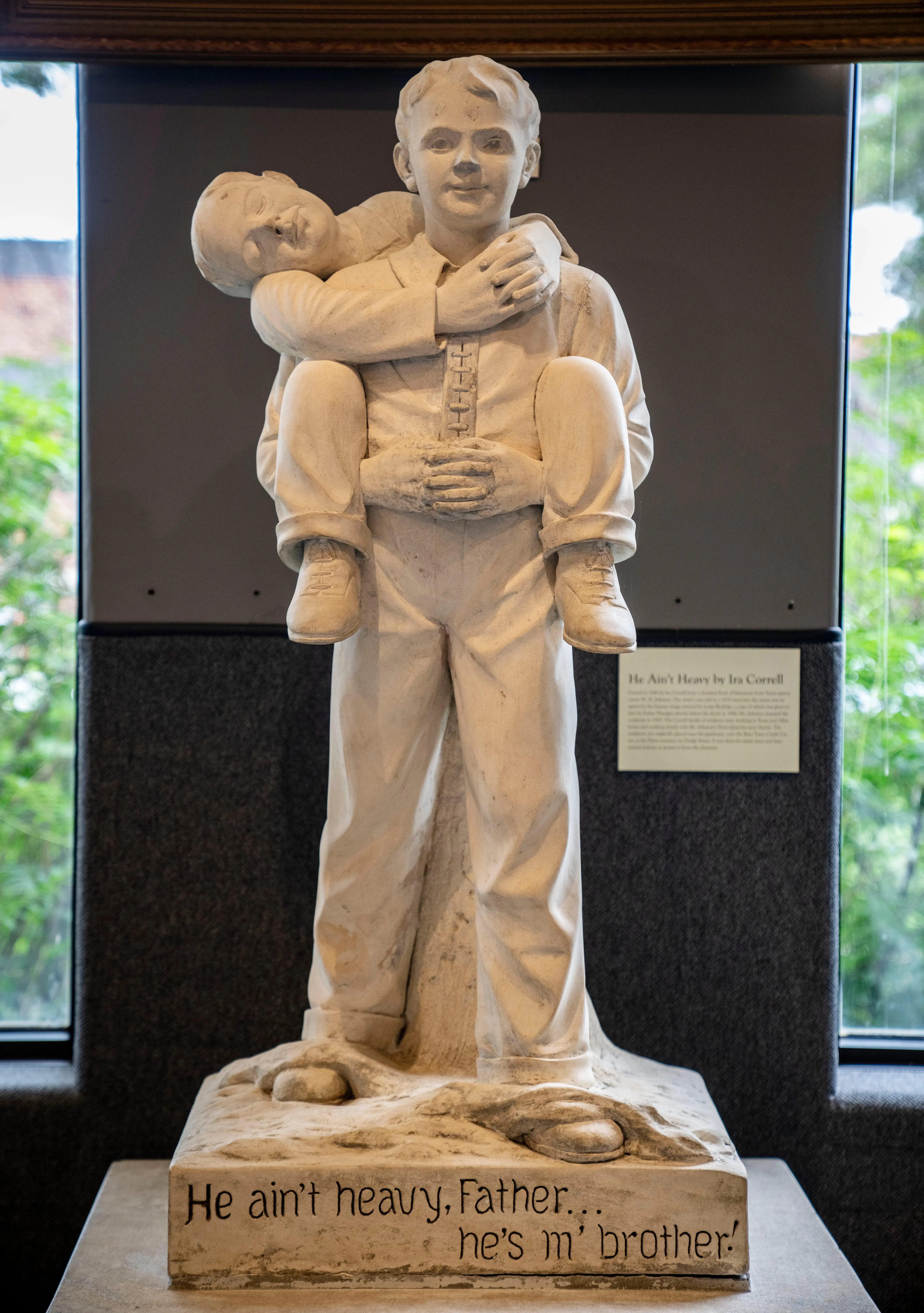
An investigative reporter for 25 years at the Des Moines Register, Lee Rood used open records requests, public records, news articles, government reports and interviews to identify allegations of abuse or other crimes reported at Boys Town.
As the Reader's Watchdog columnist at the Register for the past 13 years, Rood has reported extensively on nonprofits, child welfare issues and problems at residential facilities for youth in Iowa. An Omaha native, she also is the daughter of reporter Mick Rood, who shared a Pulitzer Prize for local investigative reporting at the Omaha Sun newspapers in 1973 for a special report on Boys Town’s fundraising.
Rood had reported previously from Boys Town and had read articles over the years about changes there. When she realized 2023 was the 50th anniversary of the Omaha Sun’s Pulitzer, she began looking more closely at the charity and its annual reports, initially with the idea of writing an update as part of a wider piece about the reduction of local investigative reporters nationally.
She discovered several reports of sexual abuse over the past five years at the Boys Town campus, a sizable endowment uncommon among human services nonprofits nationally and more spent on fundraising than at other high-asset public charities. Her editors approved a reporting project to investigate these issues. She also applied for, and received, a $3,000 reporting grant from the Pulitzer Center to help offset some of the costs of the project, including travel for her and photographer Zach Boyden-Holmes.


